|
-N-
Nautilus - "20.000 Miles Under the Sea" (Turicaphon 1978)
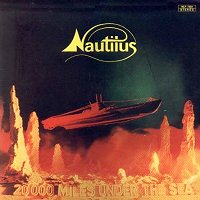 Swiss band Nautilus released their debut "20.000 Miles Under the Sea" at a time when progressive rock was considered dead and gone, and bands who doesn't give a damn about shifting trends should always be admired for that. But first of all, I can't help to point out that the title of the album probably should have been "20.000 Miles Under the SURFACE of the Sea" to get the meaning that the band obviously intended. But that's only nitpicking from me, as the music itself is good on most of the record. Musically this is typical 70's progressive rock with lots of guitar, organ and synths. The title-track opens the record, and is a powerful and punchy mid-tempo tune with a good melody and lots of nice Hammond. "Sleeping in the Wind" is more complex and varied, featuring some chords that could have been taken straight from Black Sabbath's "Sleeping Village"; although the string-synths and bubbling Moog gives it a completely different feel. This is followed by two ballads. "Like a Bird" suffers from embarrassing lyrics, and the mediocre and accented vocals were undoubtedly the weak point of this band. The song features a beautiful synth-part in the middle though. "Deep Inside of Me" is a decent song, but weakened by the helpless "lalala" part in the middle that stands as the weakest moment on the record. "Lady" opens side two, and combines hard rock with some more typical symphonic progressive rock tendencies quite well. The mid-part also features some clavinet with an interesting wah-wah twist. "Lost in Tiem" is one of the best on the album, and the instrumental parts again show the band's sense for distorting the keyboards in a kind of bubbling way. "To the Sky" is based in a powerful and fine organ-theme, and the short instrumental "Opus for Ghost, Krokodils and for Living Persons" (yes, a really hopelessly constructed title) has some strong classical influences. The earlier mentioned vocals and weak English left something to be desired, but the album still showed promise and musical talent. Swiss band Nautilus released their debut "20.000 Miles Under the Sea" at a time when progressive rock was considered dead and gone, and bands who doesn't give a damn about shifting trends should always be admired for that. But first of all, I can't help to point out that the title of the album probably should have been "20.000 Miles Under the SURFACE of the Sea" to get the meaning that the band obviously intended. But that's only nitpicking from me, as the music itself is good on most of the record. Musically this is typical 70's progressive rock with lots of guitar, organ and synths. The title-track opens the record, and is a powerful and punchy mid-tempo tune with a good melody and lots of nice Hammond. "Sleeping in the Wind" is more complex and varied, featuring some chords that could have been taken straight from Black Sabbath's "Sleeping Village"; although the string-synths and bubbling Moog gives it a completely different feel. This is followed by two ballads. "Like a Bird" suffers from embarrassing lyrics, and the mediocre and accented vocals were undoubtedly the weak point of this band. The song features a beautiful synth-part in the middle though. "Deep Inside of Me" is a decent song, but weakened by the helpless "lalala" part in the middle that stands as the weakest moment on the record. "Lady" opens side two, and combines hard rock with some more typical symphonic progressive rock tendencies quite well. The mid-part also features some clavinet with an interesting wah-wah twist. "Lost in Tiem" is one of the best on the album, and the instrumental parts again show the band's sense for distorting the keyboards in a kind of bubbling way. "To the Sky" is based in a powerful and fine organ-theme, and the short instrumental "Opus for Ghost, Krokodils and for Living Persons" (yes, a really hopelessly constructed title) has some strong classical influences. The earlier mentioned vocals and weak English left something to be desired, but the album still showed promise and musical talent.
Nektar - "Journey to the Centre of the Eye" (Bacillus 1971)
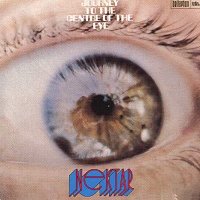 Absolutely superb progressive rock band and with no doubt the best band on the Bacillus label. Nektar consisted of a bunch of Brits who had moved to Germany and tried to make a living of music there. Their debut-album is, despite a hopelessly thin production, a classic album of space-progressive and probably the best debut from 1971. The guitar and vocals of Roye Albrigthon was always a dominating force in their music, but the other members contributed very well too and the band always focused on working as a whole and not let any member take over the sound completely. "Journey..." is an excellent, continuos, intense and conceptual 40-minute space-trip that varies from the typical harmonic Nektar-vocals and then to long, spacey instrumental excursions. With the exception of the excellent and atmospheric "Warp Oversight" (a rather experimental instrumental passage with some very Manuel Göttsching-sounding guitar-effects) the whole album was very structured with lots of great riffs and melodies. The Mellotron and vocals on the intro of "Burn out my Eyes" gives me goosebumps every time. The track later goes into beautifully atmospheric vocal-parts and aggressive instrumental-parts with lots of great guitar and organ-work. The rest of the album is just as good. "Journey..." was one of the classic progressive rock albums from 1971, high up there with "Fragile" and "Nursery Cryme". Absolutely superb progressive rock band and with no doubt the best band on the Bacillus label. Nektar consisted of a bunch of Brits who had moved to Germany and tried to make a living of music there. Their debut-album is, despite a hopelessly thin production, a classic album of space-progressive and probably the best debut from 1971. The guitar and vocals of Roye Albrigthon was always a dominating force in their music, but the other members contributed very well too and the band always focused on working as a whole and not let any member take over the sound completely. "Journey..." is an excellent, continuos, intense and conceptual 40-minute space-trip that varies from the typical harmonic Nektar-vocals and then to long, spacey instrumental excursions. With the exception of the excellent and atmospheric "Warp Oversight" (a rather experimental instrumental passage with some very Manuel Göttsching-sounding guitar-effects) the whole album was very structured with lots of great riffs and melodies. The Mellotron and vocals on the intro of "Burn out my Eyes" gives me goosebumps every time. The track later goes into beautifully atmospheric vocal-parts and aggressive instrumental-parts with lots of great guitar and organ-work. The rest of the album is just as good. "Journey..." was one of the classic progressive rock albums from 1971, high up there with "Fragile" and "Nursery Cryme".
Nektar - "A Tab in the Ocean" (Bacillus 1972)
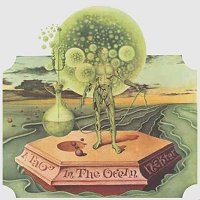 The second album was less spacey and maybe not so exciting and adventurous as a whole as "Journey..." had been, but it was graced with a MUCH more powerful and better production and the songwriting and performance was still top-notch from start to finish. The sidelong title-track has an atmosphere that suits both the title and the cover of the album very well. The production of this track is also quite interesting. It sounds like it's recorded in a big room/hall where Nektar plays in one end of the room and the recording-equipment is placed in the other end, almost giving the track a live feeling. The second side features some of their most memorable riffs. First you have "Desolation Valley" with its completely genius and striking build-up where very quiet and atmospheric vocal-parts builds up to an extremely powerful riff. The other classic here is the Mellotron-driven "King of Twilight" that was later covered by Iron Maiden in the 80's!! "Cryin' in the Dark" is a more standard hard-rock track, but still very good. Nektar always tried something new with each album and they managed to give it their own distinctive sound and signature no matter what progressive rock style they played. In that sense, "A Tab in the Ocean" was probably their heavy-progressive album and it's a classic of the genre. The second album was less spacey and maybe not so exciting and adventurous as a whole as "Journey..." had been, but it was graced with a MUCH more powerful and better production and the songwriting and performance was still top-notch from start to finish. The sidelong title-track has an atmosphere that suits both the title and the cover of the album very well. The production of this track is also quite interesting. It sounds like it's recorded in a big room/hall where Nektar plays in one end of the room and the recording-equipment is placed in the other end, almost giving the track a live feeling. The second side features some of their most memorable riffs. First you have "Desolation Valley" with its completely genius and striking build-up where very quiet and atmospheric vocal-parts builds up to an extremely powerful riff. The other classic here is the Mellotron-driven "King of Twilight" that was later covered by Iron Maiden in the 80's!! "Cryin' in the Dark" is a more standard hard-rock track, but still very good. Nektar always tried something new with each album and they managed to give it their own distinctive sound and signature no matter what progressive rock style they played. In that sense, "A Tab in the Ocean" was probably their heavy-progressive album and it's a classic of the genre.
Cover
Nektar - "...Sounds Like This" (Bacillus 1973)
 This badly produced double-album was a major disappointment after their two first excellent releases. The record was recorded live in the studio, and the final result didn't even sound like it had been given a decent mixing and production-job at all. The material was not on par with their previous records either, and varied between tiresome jamming and uninspired attempts at writing shorter and less complex songs with anthem-like choruses. The opener "Good Day" is an example of this, and even not Albrighton's distinctive vocals and guitar-work can save it from being a mediocre and boring tune. "New Day Dawning" is one of the better tracks, but is considerably weakened by the overall poor sound quality of the record. And the stinker "What Ya Gonna Do?" is Nektar at their absolutely worst, jamming over some idiotic and generic wannabe-rock'n'roll. "1-2-3-4" is the first of three lengthy jams on the album, and suffers from literally everything. Dumb lyrics, cheesy riffs and murky jamming that go nowhere. "Do You Believe in Magic" and "Cast Your Fate" are slightly better and more structured tunes, but they just can't come up to the same standard as "Desolation Valley" or "King of Twilight". "A Day in the Life of a Preacher" is the best of the jam-based suites on the album, but it would work even better on stage. "Wings" is a pretty little tune that probably has the best melody on the album, even if that doesn't say much. The record closes with yet another long jam in "Odyssee" and it's mostly a rather messy piece that never evolves into something really memorable. And the so-called production becomes nearly unlistenable at the end of this track. But their next album would fortunately more than make up for this misstep of a record. This badly produced double-album was a major disappointment after their two first excellent releases. The record was recorded live in the studio, and the final result didn't even sound like it had been given a decent mixing and production-job at all. The material was not on par with their previous records either, and varied between tiresome jamming and uninspired attempts at writing shorter and less complex songs with anthem-like choruses. The opener "Good Day" is an example of this, and even not Albrighton's distinctive vocals and guitar-work can save it from being a mediocre and boring tune. "New Day Dawning" is one of the better tracks, but is considerably weakened by the overall poor sound quality of the record. And the stinker "What Ya Gonna Do?" is Nektar at their absolutely worst, jamming over some idiotic and generic wannabe-rock'n'roll. "1-2-3-4" is the first of three lengthy jams on the album, and suffers from literally everything. Dumb lyrics, cheesy riffs and murky jamming that go nowhere. "Do You Believe in Magic" and "Cast Your Fate" are slightly better and more structured tunes, but they just can't come up to the same standard as "Desolation Valley" or "King of Twilight". "A Day in the Life of a Preacher" is the best of the jam-based suites on the album, but it would work even better on stage. "Wings" is a pretty little tune that probably has the best melody on the album, even if that doesn't say much. The record closes with yet another long jam in "Odyssee" and it's mostly a rather messy piece that never evolves into something really memorable. And the so-called production becomes nearly unlistenable at the end of this track. But their next album would fortunately more than make up for this misstep of a record.
Nektar - "Remember the Future" (Bacillus 1973)
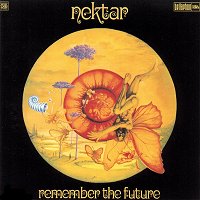 "Remember the Future" remains Nektar's most popular and loved album, and that's with good reason. First of all, it has probably the most accomplished and perfected Nektar-sound of all their albums. Never before or after have Roye Albrigthon's perfect vocal-harmonies and guitar-playing sounded better, more distinctive and...Nektar-like! And not at least, the whole album is made up of a wonderful, 40-minute suite without a dead or unnecessary second at all. The melodies, atmosphere, playing, arrangements, production and construction of the whole piece are just so goddamn...perfect! Everyone who says that progressive rock is unstructured mess and instrumental self-indulgence should take a listen to this album. With the exception of the instrumental-part at the end of the first side, the whole piece is strongly based in carefully structured and well-written parts where the each member of the bands works wonderfully as integrated parts in the whole sound. The concept of the album is about a boy who speaks to an extraterrestial being in the form of a bird, and the whole story has a very optimistic and positive message. This album is just as essential in a progressive rock collection as "Close to the Edge", "Selling England by the Pound", "Brain Salad Surgery" and "Thick as a Brick". "Remember the Future" remains Nektar's most popular and loved album, and that's with good reason. First of all, it has probably the most accomplished and perfected Nektar-sound of all their albums. Never before or after have Roye Albrigthon's perfect vocal-harmonies and guitar-playing sounded better, more distinctive and...Nektar-like! And not at least, the whole album is made up of a wonderful, 40-minute suite without a dead or unnecessary second at all. The melodies, atmosphere, playing, arrangements, production and construction of the whole piece are just so goddamn...perfect! Everyone who says that progressive rock is unstructured mess and instrumental self-indulgence should take a listen to this album. With the exception of the instrumental-part at the end of the first side, the whole piece is strongly based in carefully structured and well-written parts where the each member of the bands works wonderfully as integrated parts in the whole sound. The concept of the album is about a boy who speaks to an extraterrestial being in the form of a bird, and the whole story has a very optimistic and positive message. This album is just as essential in a progressive rock collection as "Close to the Edge", "Selling England by the Pound", "Brain Salad Surgery" and "Thick as a Brick".
Label
Cover
Nektar - "Down to Earth" (Bacillus 1974)
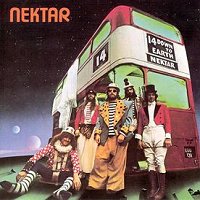 As "Remember the Future" had been a surprisingly big success in the US, it may not come as a surprise that the follow-up was an attempt at making the Nektar-sound more accessible and commercial with shorter tracks. And the band actually did this very well without sacrificing too much of their progressive roots. The opening track is a very light-weighted and poppy tune that may make you a little bit sceptic at first listen, but the classic Nektar-sound and style is fortunately very well taken care of most of the time, especially in "That's Life" and "Show Me the Way". Both tracks are classic Nektar in the same style as "Remember the Future". The band also introduced horns on some tracks, and it sounded very good on the groovy instrumental "Nelly the Elephant" and the classic Nektar-rocker "Fidgety Queen". "Oh Willy" starts as yet another rocker in the same style, but has a wonderful and melodic mid-part. "Early Morning Clown" is tasty, light and melodic progressive with an irresistible atmosphere and harmonies. Personally I think that "Remember the Future" and this album are the ones that best demonstrate the classic Nektar-sound at its most typical and accomplished. As "Remember the Future" had been a surprisingly big success in the US, it may not come as a surprise that the follow-up was an attempt at making the Nektar-sound more accessible and commercial with shorter tracks. And the band actually did this very well without sacrificing too much of their progressive roots. The opening track is a very light-weighted and poppy tune that may make you a little bit sceptic at first listen, but the classic Nektar-sound and style is fortunately very well taken care of most of the time, especially in "That's Life" and "Show Me the Way". Both tracks are classic Nektar in the same style as "Remember the Future". The band also introduced horns on some tracks, and it sounded very good on the groovy instrumental "Nelly the Elephant" and the classic Nektar-rocker "Fidgety Queen". "Oh Willy" starts as yet another rocker in the same style, but has a wonderful and melodic mid-part. "Early Morning Clown" is tasty, light and melodic progressive with an irresistible atmosphere and harmonies. Personally I think that "Remember the Future" and this album are the ones that best demonstrate the classic Nektar-sound at its most typical and accomplished.
Nektar - "Recycled" (Bacillus 1975)
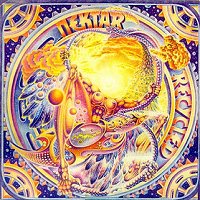 "Recycled" went back to the "several-small-tracks-creating-a-long-suite" structure of their very first album. Organ and some Mellotron had been the only keyboards Nektar had used so far, but on "Recycled" they had taken in a guest-musician Larry Fast on synths. "Recycled" has overall a very fat and powerful production and is generally rated as one of Nektar's best works, but personally I also think it has some flaws. First of all, the synth-sounds of Fast sounds often rather ugly and synthetic in my ears. And the two first parts on the second side of the album sounds like a truly embarrassing and tasteless attempt of fusing the classic Nektar-sound with some samba/Rio/Latin-sounding stuff. Horrible! However, most of the first side is Nektar from their best and most intense side despite some terrible synth-sounds, especially on the opening vocal-part. But the good and inspired song-writing more than makes up for it. The two last songs on the album shows the band moving into an almost pop-progressive vein, and "Marvellous Moses" was probably the track where the synths of Fast worked best. A good album, but personally I don't think it's as satisfying as the previous ones. "Recycled" went back to the "several-small-tracks-creating-a-long-suite" structure of their very first album. Organ and some Mellotron had been the only keyboards Nektar had used so far, but on "Recycled" they had taken in a guest-musician Larry Fast on synths. "Recycled" has overall a very fat and powerful production and is generally rated as one of Nektar's best works, but personally I also think it has some flaws. First of all, the synth-sounds of Fast sounds often rather ugly and synthetic in my ears. And the two first parts on the second side of the album sounds like a truly embarrassing and tasteless attempt of fusing the classic Nektar-sound with some samba/Rio/Latin-sounding stuff. Horrible! However, most of the first side is Nektar from their best and most intense side despite some terrible synth-sounds, especially on the opening vocal-part. But the good and inspired song-writing more than makes up for it. The two last songs on the album shows the band moving into an almost pop-progressive vein, and "Marvellous Moses" was probably the track where the synths of Fast worked best. A good album, but personally I don't think it's as satisfying as the previous ones.
Nektar - "Nektar" (Bacillus 1976)
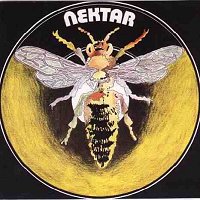 This compilation from 1976 was made up of tracks from Nektar's three first albums, and was obviously aimed at the American market, as none of those albums were available over there. All the songs have been remixed, and especially the tracks from "...Sounds Like This" benefit a lot from it. "Do You Believe in Magic" have even been completely re-recorded, and sounds far better than the muddled original version. But it's hard to not miss "Desolation Valley" when it comes to the selections from "A Tab in the Ocean". On the other hand, they couldn't get everything on a single album either. "Journey to the Centre of the Eye" is represented by an 11-minute excerpt, and gives a good clue about that album for listeners who haven't heard it yet. And again, the remixing is really good and improves the sound considerably. This album offers great music from start to finish, but it's still no substitute or excuse for not having "Journey to the Centre of the Eye" and "A Tab in the Ocean". This compilation from 1976 was made up of tracks from Nektar's three first albums, and was obviously aimed at the American market, as none of those albums were available over there. All the songs have been remixed, and especially the tracks from "...Sounds Like This" benefit a lot from it. "Do You Believe in Magic" have even been completely re-recorded, and sounds far better than the muddled original version. But it's hard to not miss "Desolation Valley" when it comes to the selections from "A Tab in the Ocean". On the other hand, they couldn't get everything on a single album either. "Journey to the Centre of the Eye" is represented by an 11-minute excerpt, and gives a good clue about that album for listeners who haven't heard it yet. And again, the remixing is really good and improves the sound considerably. This album offers great music from start to finish, but it's still no substitute or excuse for not having "Journey to the Centre of the Eye" and "A Tab in the Ocean".
Nektar - "Magic is a Child" (Bacillus 1977)
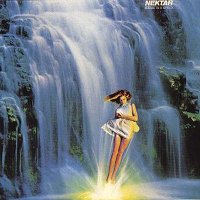 Roye Albrighton was no longer a member of Nektar in 1977, and the American Dave Nelson replaced him. Nektar could not be the same without Albrighton's distinctive voice and guitar-playing, and nothing proved this better than the pathetic "Magic is a Child". The album had obviously some kind of a concept, and opened with "Away from Asgard" that sounded mostly like a bad Yes-clone. Nelson also makes several attempts at imitating Albrighton's style of playing in "Eerie Lackawanna" and "Train From Nowhere" but never succeeds very well, and the poor material have to take some of the blame for it. "Listen" sounds like an attempt at making melo-dramatic AOR, while the band do whatever they can to bore the crap out of the listener with worthless drivel like "Midnight Light", "Love to Share" and "On the Run (The Trucker)". But there are two listenable tracks here too. The title-track is a pleasant but far from fantastic melodic ballad with some nice harpsichord, while the closing-number "Spread Your Wings" is an enjoyable rocker. This is a typical bad late 70's album for a once great progressive rock band. Roye Albrighton was no longer a member of Nektar in 1977, and the American Dave Nelson replaced him. Nektar could not be the same without Albrighton's distinctive voice and guitar-playing, and nothing proved this better than the pathetic "Magic is a Child". The album had obviously some kind of a concept, and opened with "Away from Asgard" that sounded mostly like a bad Yes-clone. Nelson also makes several attempts at imitating Albrighton's style of playing in "Eerie Lackawanna" and "Train From Nowhere" but never succeeds very well, and the poor material have to take some of the blame for it. "Listen" sounds like an attempt at making melo-dramatic AOR, while the band do whatever they can to bore the crap out of the listener with worthless drivel like "Midnight Light", "Love to Share" and "On the Run (The Trucker)". But there are two listenable tracks here too. The title-track is a pleasant but far from fantastic melodic ballad with some nice harpsichord, while the closing-number "Spread Your Wings" is an enjoyable rocker. This is a typical bad late 70's album for a once great progressive rock band.
Nektar - "Live in New York" (Bacillus 1977)
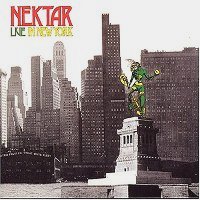 This double-album, recorded in New York September 1974, could have served as a decent document of Nektar on stage, but is partly ruined by poor sound-quality. That's sad, as the track-list hardly could have got any better. Here you have Nektar classics like "Desolation Valley", "King of Twilight", "A Day in the Life of a Preacher", "That's Life", "Show Me the Way" and a couple of excerpts from "Remember the Future". The performance of the material sounds raw, powerful and energetic, just the way it's meant to be on a good live-album. And I even think this version of "It's All Over" works better than the original one on "Recycled". But again, the sound-quality is simply too bad for being an official album from as late as 1977. It's thin, muddled and lacks power. Fortunately, the next live release proved to be better. This double-album, recorded in New York September 1974, could have served as a decent document of Nektar on stage, but is partly ruined by poor sound-quality. That's sad, as the track-list hardly could have got any better. Here you have Nektar classics like "Desolation Valley", "King of Twilight", "A Day in the Life of a Preacher", "That's Life", "Show Me the Way" and a couple of excerpts from "Remember the Future". The performance of the material sounds raw, powerful and energetic, just the way it's meant to be on a good live-album. And I even think this version of "It's All Over" works better than the original one on "Recycled". But again, the sound-quality is simply too bad for being an official album from as late as 1977. It's thin, muddled and lacks power. Fortunately, the next live release proved to be better.
Nektar - "More Live in New York" (Bacillus 1978)
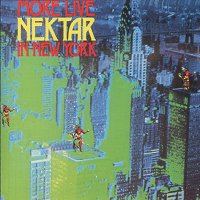 This was yet another double live-set with recordings from Nektar's concerts in New York in 1974. It's undoubtedly the one to have of the two albums. The inclusion of an edited but very energetic version of "Remember the Future" makes it a more complete package. And the sound is better this time. Nektar also gave the audience a taste of "Recycled" as they performed "Marvellous Moses" here. "That's Life" and "Show Me the Way" are among the best performances on the record. "Fidgety Queen" rocks and moves the way it's supposed to do, even without the horns of the studio recording. The only bad thing is that the album sounds to be rather carelessly and hastily pieced together. "Fidgety Queen" opens the album, even if it obviously was the encore on the concerts. And on several places you can hear the band start to play a new track before the other one is fully faded out. But despite these flaws, this is probably the only live-album by Nektar worth having. This was yet another double live-set with recordings from Nektar's concerts in New York in 1974. It's undoubtedly the one to have of the two albums. The inclusion of an edited but very energetic version of "Remember the Future" makes it a more complete package. And the sound is better this time. Nektar also gave the audience a taste of "Recycled" as they performed "Marvellous Moses" here. "That's Life" and "Show Me the Way" are among the best performances on the record. "Fidgety Queen" rocks and moves the way it's supposed to do, even without the horns of the studio recording. The only bad thing is that the album sounds to be rather carelessly and hastily pieced together. "Fidgety Queen" opens the album, even if it obviously was the encore on the concerts. And on several places you can hear the band start to play a new track before the other one is fully faded out. But despite these flaws, this is probably the only live-album by Nektar worth having.
Neuschwanstein - "Battlement" (Racket 1979)
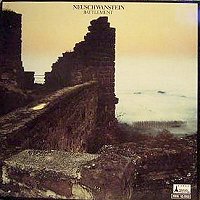 This German band released a decent album of Genesis-influenced progressive rock, although without coming close to neither that band nor other and better Genesis-clones, such as the superb Kyrie Eleison. The album feels simply a bit too lightweight for that, and it lacks a real standout track, although the songwriting is OK through the entire album. The opener "Loafer Jack" is a nice and cosy song about a wandering troubadour/flutist. The singer sounds a lot like Peter Gabriel, and the arrangements are quite representative for the rest of the album. Atmospheric guitars, flute, tasty synths and a very airy sound. "Ice With Dwale" could very well be my favourite on the album, but as mentioned, it's hard to pick any particular standout track. It's got a catchy melody, good flute and a nice solo-break with a very Genesis-like atmosphere. "Intruders and the Punishment" sounds partly like it's ripped directly from "The Cinema Show" and the drumming sounds exactly like Phil Collins. "Beyond the Bugle" is the most complex track on the album. It starts very quiet before it turns into a part with some powerful bass-work. After that, everything turns very dark and dramatic with some sinister voices before a Mellotron appears and the mood gets brighter at the end of the track. The title-track is also somewhat dramatic, but in a different way. It demonstrates intelligent use of el-piano, but the vocals are for some unknown reason much weaker here than on the rest of the album. The album closes with the instrumental-number "Zärtlicher Abschied" that is technically the best thing the band managed to pull off. "Battlement" is overall a nice listen most of the time, but don't expect anything spectacular. This German band released a decent album of Genesis-influenced progressive rock, although without coming close to neither that band nor other and better Genesis-clones, such as the superb Kyrie Eleison. The album feels simply a bit too lightweight for that, and it lacks a real standout track, although the songwriting is OK through the entire album. The opener "Loafer Jack" is a nice and cosy song about a wandering troubadour/flutist. The singer sounds a lot like Peter Gabriel, and the arrangements are quite representative for the rest of the album. Atmospheric guitars, flute, tasty synths and a very airy sound. "Ice With Dwale" could very well be my favourite on the album, but as mentioned, it's hard to pick any particular standout track. It's got a catchy melody, good flute and a nice solo-break with a very Genesis-like atmosphere. "Intruders and the Punishment" sounds partly like it's ripped directly from "The Cinema Show" and the drumming sounds exactly like Phil Collins. "Beyond the Bugle" is the most complex track on the album. It starts very quiet before it turns into a part with some powerful bass-work. After that, everything turns very dark and dramatic with some sinister voices before a Mellotron appears and the mood gets brighter at the end of the track. The title-track is also somewhat dramatic, but in a different way. It demonstrates intelligent use of el-piano, but the vocals are for some unknown reason much weaker here than on the rest of the album. The album closes with the instrumental-number "Zärtlicher Abschied" that is technically the best thing the band managed to pull off. "Battlement" is overall a nice listen most of the time, but don't expect anything spectacular.
New Trolls - "Ut" (Fonit Cetra 1972)
 From what I've heard, this Italian band never knew what kind of music they should play. "Ut" is considered to be one of their best and most progressive albums. And in fact, it's a quite varied album. It opens with "Studio", a very classical influenced instrumental. This floats into the excellent but too short "XXIIa Strada" which is not too far from ELP. "C'È Troppa Guerra" on the other hand, is a complex and energetic hard-rock track. Personally I like the ballads on the album best. "Storia Di Una Foglia" has a very emotional melody and some long jamming, while "Chi Mi Può Capire" simply is a very beautiful and symphonic ballad. "Storia Di Una Foglia" seems to have a slight Gentle Giant influence on the organ-riff. Overall, this album reveals a band that didn't know what direction they should go in, but the songwriting is in periods very good. From what I've heard, this Italian band never knew what kind of music they should play. "Ut" is considered to be one of their best and most progressive albums. And in fact, it's a quite varied album. It opens with "Studio", a very classical influenced instrumental. This floats into the excellent but too short "XXIIa Strada" which is not too far from ELP. "C'È Troppa Guerra" on the other hand, is a complex and energetic hard-rock track. Personally I like the ballads on the album best. "Storia Di Una Foglia" has a very emotional melody and some long jamming, while "Chi Mi Può Capire" simply is a very beautiful and symphonic ballad. "Storia Di Una Foglia" seems to have a slight Gentle Giant influence on the organ-riff. Overall, this album reveals a band that didn't know what direction they should go in, but the songwriting is in periods very good.
The Nice - "The Nice" (Immediate 1969)
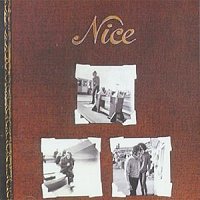 The Nice was, as many of you will know, Keith Emerson's first band. There's no point in denying the fact that The Nice had an tremendous impact and importance for the evolution of progressive rock in the late 60's. They was one of the very first bands to fuse rock with classical music and jazz, but it was often in a very embryonic way and not all of their music have stood the test of time. "The Nice" was their third one, and it's a quite messy album, consisting of live-tracks, cover-versions and even a re-recorded version of the b-side of a one of their singles. It's a real mystery to me why some people are calling this unfocused mess "a classic". The album opens with the earlier mentioned re-recording of "Azrael". A boring song that gets even worse by the dreadful vocals of Lee Jackson. Their version of Tim Hardin's "Hang on to a Dream" is on the other hand one of the better moments here. "Diary of an Empty Day" is an example of the uninteresting and very lightweight psychedelic pop that they always included on their albums. "For Example" is a completely different story. This is a very powerful, jazz-influenced progressive piece with lots of energy, but Ekseption would do a much better version of this track on their 5th album. The live-tracks allow Emerson to stretch out and give a few glimpses of what was to come in ELP. First you have the raw and energetic instrumental-number "Rondo 69" and then a 12-minute progressive version of Bob Dylan's "She Belongs to Me" that includes some fine playing from the whole band. But too much of this album bores me, and is of interest to progressive rock historians only. The Nice was, as many of you will know, Keith Emerson's first band. There's no point in denying the fact that The Nice had an tremendous impact and importance for the evolution of progressive rock in the late 60's. They was one of the very first bands to fuse rock with classical music and jazz, but it was often in a very embryonic way and not all of their music have stood the test of time. "The Nice" was their third one, and it's a quite messy album, consisting of live-tracks, cover-versions and even a re-recorded version of the b-side of a one of their singles. It's a real mystery to me why some people are calling this unfocused mess "a classic". The album opens with the earlier mentioned re-recording of "Azrael". A boring song that gets even worse by the dreadful vocals of Lee Jackson. Their version of Tim Hardin's "Hang on to a Dream" is on the other hand one of the better moments here. "Diary of an Empty Day" is an example of the uninteresting and very lightweight psychedelic pop that they always included on their albums. "For Example" is a completely different story. This is a very powerful, jazz-influenced progressive piece with lots of energy, but Ekseption would do a much better version of this track on their 5th album. The live-tracks allow Emerson to stretch out and give a few glimpses of what was to come in ELP. First you have the raw and energetic instrumental-number "Rondo 69" and then a 12-minute progressive version of Bob Dylan's "She Belongs to Me" that includes some fine playing from the whole band. But too much of this album bores me, and is of interest to progressive rock historians only.
The Nice - "Five Bridges" (Charisma 1970)
 The Nice switched label from Immediate to Charisma in 1970, and finally released the record they were formed to make: "Five Bridges". This grandiose album was recorded live with the Sinfonia of London, and remains the best thing the band ever made and their only album that actually seems to be focused at something. The title-track was a suite in five parts that took up all of the first side. It's an impressive and complex composition that creates lots of dynamics and contrasts between the orchestra and the band. I personally think that this was the first time Keith Emerson really showed some of his true potential as a composer. The version of Sibelius' "Intermezzo from Karelia Suite" is better than the one on "Ars Longa Vita Brevis" as the orchestra adds more symphonic might to it here. Their adaptation of the third movement from Tchaikovsky's "Patetique Symphony" also works surprisingly fine. It's easy to hear why Rick van der Linden rated this as one his ten favourite albums of all time, as this stuff undoubtedly had a great impact on Ekseption. They also attempted to fuse Dylan's "Country Pie" with the sixth concerto from Bach's Brandenburg concertos, and the result is a funny piece of early progressive rock. The album closes with a short song recorded in the studio that is rather out of place on the album, and I usually skip it. But "Five Bridges" still deserves a place among the classics of early, classical influenced progressive rock, and it's the only album by The Nice that you need. The Nice switched label from Immediate to Charisma in 1970, and finally released the record they were formed to make: "Five Bridges". This grandiose album was recorded live with the Sinfonia of London, and remains the best thing the band ever made and their only album that actually seems to be focused at something. The title-track was a suite in five parts that took up all of the first side. It's an impressive and complex composition that creates lots of dynamics and contrasts between the orchestra and the band. I personally think that this was the first time Keith Emerson really showed some of his true potential as a composer. The version of Sibelius' "Intermezzo from Karelia Suite" is better than the one on "Ars Longa Vita Brevis" as the orchestra adds more symphonic might to it here. Their adaptation of the third movement from Tchaikovsky's "Patetique Symphony" also works surprisingly fine. It's easy to hear why Rick van der Linden rated this as one his ten favourite albums of all time, as this stuff undoubtedly had a great impact on Ekseption. They also attempted to fuse Dylan's "Country Pie" with the sixth concerto from Bach's Brandenburg concertos, and the result is a funny piece of early progressive rock. The album closes with a short song recorded in the studio that is rather out of place on the album, and I usually skip it. But "Five Bridges" still deserves a place among the classics of early, classical influenced progressive rock, and it's the only album by The Nice that you need.
The Nice - "Elegy" (Charisma 1971)
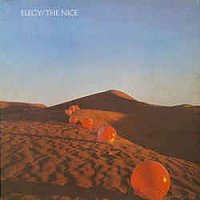 This was a posthumously released collection of live-recordings. It didn't stand a chance to reach the same heights as "Five Bridges", but it did feature a few gems and was still better than any of the three first albums on Immediate. It includes what I personally view as their best Dylan-cover in form of "My Back Pages". The band have kept the basic melody of the song, but given it a complex and very progressive arrangement (and length). "Elegy" also gives you a chance to hear them perform their legendary version of Leonard Bernstein's "America". Their original version from 1968 became more or less their signature track, but the version here is much longer and complete with lots of entertaining organ-torture from Emerson. Another version of the third movement from Tchaikovsky's "Patetique Symphony" comes off as rather redundant, as the version on "Five Bridges" was much more interesting. A nearly 13-minute version of "Hang on to a Dream" shows Emerson taking some really long excursions on piano, and the structure and length of this performance may gave him some ideas to "Take a Pebble" from Emerson, Lake and Palmer's debut. This was a posthumously released collection of live-recordings. It didn't stand a chance to reach the same heights as "Five Bridges", but it did feature a few gems and was still better than any of the three first albums on Immediate. It includes what I personally view as their best Dylan-cover in form of "My Back Pages". The band have kept the basic melody of the song, but given it a complex and very progressive arrangement (and length). "Elegy" also gives you a chance to hear them perform their legendary version of Leonard Bernstein's "America". Their original version from 1968 became more or less their signature track, but the version here is much longer and complete with lots of entertaining organ-torture from Emerson. Another version of the third movement from Tchaikovsky's "Patetique Symphony" comes off as rather redundant, as the version on "Five Bridges" was much more interesting. A nearly 13-minute version of "Hang on to a Dream" shows Emerson taking some really long excursions on piano, and the structure and length of this performance may gave him some ideas to "Take a Pebble" from Emerson, Lake and Palmer's debut.
Nova - "Atlantis" (Love 1976)
 Nova was a band from Finland who released an album of melodic and mellow progressive rock. Their music was quite vocal-orientated, and all the lyrics were sung in their native language. The 15-minute opener "Se Vuosi" features lengthy vocal-parts with a backdrop of piano and organ, and Pink Floyd seems to be an important inspiration for this track. The organ usually dominates the brief instrumental-passages. "Kaupungin Naiset" is a short and bluesy number that I personally feel doesn't fit very well into the album. Side 2 opens with the title-track. The organ sounds more powerful here, and the vocals have some strong melodies. There are also some atmospheric breaks with lots of string-synths here. Probably the best track on the album. "Vanha Surullinen Laulu" closes the album in a very mellow and moody way. This song sounds slightly Italian in my ears. A pleasant and decent album of slow-paced symphonic progressive rock, although nothing spectacular. Nova was a band from Finland who released an album of melodic and mellow progressive rock. Their music was quite vocal-orientated, and all the lyrics were sung in their native language. The 15-minute opener "Se Vuosi" features lengthy vocal-parts with a backdrop of piano and organ, and Pink Floyd seems to be an important inspiration for this track. The organ usually dominates the brief instrumental-passages. "Kaupungin Naiset" is a short and bluesy number that I personally feel doesn't fit very well into the album. Side 2 opens with the title-track. The organ sounds more powerful here, and the vocals have some strong melodies. There are also some atmospheric breaks with lots of string-synths here. Probably the best track on the album. "Vanha Surullinen Laulu" closes the album in a very mellow and moody way. This song sounds slightly Italian in my ears. A pleasant and decent album of slow-paced symphonic progressive rock, although nothing spectacular.
Novalis - "Banished Bridge" (Brain 1973)
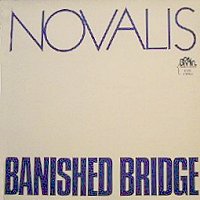 Novalis was one of the best symphonic progressive rock bands to ever come from Germany in my opinion. They played a strongly melodic and atmospheric kind of symphonic progressive rock with German lyrics that often was based on the beautiful poems of the 16th century poet Friedrich Freiherr von Hardenberg ("Novalis" was his alias). But with clumsy English lyrics and no electric guitar, this debut-album is a little bit different than the later works by the band, and didn't show all that much what the group really was capable of. The album opens with the 17-minute title-track. This track has a quite romantic atmosphere to it, and Jürgen Wenzel's vocal style is sometimes in the Pink Floyd vein. There's lots of great sounding organ and synthesisers here, but the lack of really memorable melodies and themes makes it a bit tedious. The material on the second side is a bit stronger. "Higher Evolution" is a good song with a nice melody. "Laughing" is with it's long and floating organ dominated instrumental parts and acoustic, Pink Floyd-ish vocal part is probably the best track on the album. "Inside of Me (Inside of You)" is a melodic track in a late 60's progressive vein. A debut with some promising tendencies, but nothing special or particularly impressive compared to their later albums. Novalis was one of the best symphonic progressive rock bands to ever come from Germany in my opinion. They played a strongly melodic and atmospheric kind of symphonic progressive rock with German lyrics that often was based on the beautiful poems of the 16th century poet Friedrich Freiherr von Hardenberg ("Novalis" was his alias). But with clumsy English lyrics and no electric guitar, this debut-album is a little bit different than the later works by the band, and didn't show all that much what the group really was capable of. The album opens with the 17-minute title-track. This track has a quite romantic atmosphere to it, and Jürgen Wenzel's vocal style is sometimes in the Pink Floyd vein. There's lots of great sounding organ and synthesisers here, but the lack of really memorable melodies and themes makes it a bit tedious. The material on the second side is a bit stronger. "Higher Evolution" is a good song with a nice melody. "Laughing" is with it's long and floating organ dominated instrumental parts and acoustic, Pink Floyd-ish vocal part is probably the best track on the album. "Inside of Me (Inside of You)" is a melodic track in a late 60's progressive vein. A debut with some promising tendencies, but nothing special or particularly impressive compared to their later albums.
Novalis - "Novalis" (Brain 1975)
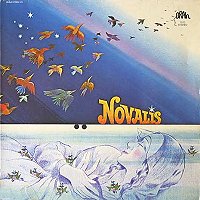 The band had already been joined by guitarist Detlev Job, who added electric guitar to their sound, when Wenzel was kicked out of the band after a dispute with the other members. Carlo Karges replaced him on guitar and keyboards. All the vocals were taken over by Schünzel. The band had now also changed to their unique concept: German lyrics based on the poems of "Novalis", the German poet that the band had named themselves after. The album featured two of their strongest songs ever with "Wer Schmetterlinge Lachen Hört" and "Es Färbte Sich die Wiese Grün". Both are lengthy tracks with beautiful, melodic vocal-parts and extended instrumental parts with lots of inspired and atmospheric themes. The rest of the album is entirely instrumental. "Impressionen" is an impressive adaptation of Brückner's 5th symphony, and one of their best instrumental-numbers ever. The energetic opener "Sonnengeflect" is drenched with cool Moogs, while "Dronz" is a spacey and atmospheric track that will make you feel like floating through space. VERY German sounding. But "Wer Schmetterlinge Lachen Hört" and "Es Färbte Sich die Wiese Grün" are still the tracks that carries the album and make it one of the classics of German 70's progressive rock. The band had already been joined by guitarist Detlev Job, who added electric guitar to their sound, when Wenzel was kicked out of the band after a dispute with the other members. Carlo Karges replaced him on guitar and keyboards. All the vocals were taken over by Schünzel. The band had now also changed to their unique concept: German lyrics based on the poems of "Novalis", the German poet that the band had named themselves after. The album featured two of their strongest songs ever with "Wer Schmetterlinge Lachen Hört" and "Es Färbte Sich die Wiese Grün". Both are lengthy tracks with beautiful, melodic vocal-parts and extended instrumental parts with lots of inspired and atmospheric themes. The rest of the album is entirely instrumental. "Impressionen" is an impressive adaptation of Brückner's 5th symphony, and one of their best instrumental-numbers ever. The energetic opener "Sonnengeflect" is drenched with cool Moogs, while "Dronz" is a spacey and atmospheric track that will make you feel like floating through space. VERY German sounding. But "Wer Schmetterlinge Lachen Hört" and "Es Färbte Sich die Wiese Grün" are still the tracks that carries the album and make it one of the classics of German 70's progressive rock.
Novalis - "Sommerabend" (Brain 1976)
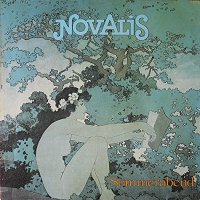 Carlo Karges had left the band, reducing Novalis to a quartet. However, it was this reduced line-up who recorded Novalis' probably best album "Sommerabend" that also became their breakthrough. The material is easily some of the strongest and most consistent the band ever wrote, making the album one of the ten best ones of German symphonic progressive rock. It opens with the instrumental "Aufbrüch" and this track demonstrated the band's musical vision quite well with its warm, romantic atmosphere and strong melodic themes. "Wunderschätze" is a beautiful and mellow vocal-track with the obligatory instrumental break in the middle. And again, the music fitted perfect to von Hardenberg's poetry. The 18-minute title-track consists of several beautiful themes with lots of floating and dreamy keyboards that create a wonderful feeling of warm summer evenings. This album remains one of my personal favourites each time the summer comes around and I want some progressive rock that captures the mood and atmosphere of that season. Very tasteful and recommended stuff. Carlo Karges had left the band, reducing Novalis to a quartet. However, it was this reduced line-up who recorded Novalis' probably best album "Sommerabend" that also became their breakthrough. The material is easily some of the strongest and most consistent the band ever wrote, making the album one of the ten best ones of German symphonic progressive rock. It opens with the instrumental "Aufbrüch" and this track demonstrated the band's musical vision quite well with its warm, romantic atmosphere and strong melodic themes. "Wunderschätze" is a beautiful and mellow vocal-track with the obligatory instrumental break in the middle. And again, the music fitted perfect to von Hardenberg's poetry. The 18-minute title-track consists of several beautiful themes with lots of floating and dreamy keyboards that create a wonderful feeling of warm summer evenings. This album remains one of my personal favourites each time the summer comes around and I want some progressive rock that captures the mood and atmosphere of that season. Very tasteful and recommended stuff.
Label
Novalis - "Konzerte" (Brain 1977)
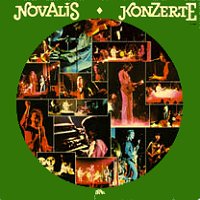 The success of "Sommerabend" caught the band by surprise, so they decided to quit their jobs and become a fulltime professional band. They were also expanded to a five piece again, as Fred Mühlbück who took over most of the vocals and also played guitar and flute joined them. His vocal style was very different from Job and Schünzel, sounding much lighter and with a higher range. Novalis' first album with him was the thoroughly solid live album "Konzerte" recorded at four different locations in Germany from January to April 1977: the Stadthalle in Göttingen, the Brain-Festival in Essen, the Nordlandhalle in Lünburg and the Oldenburg Universität. It opens with the finale from Ravel's "Bolero" on tape, so the band obviously opened their concerts with that piece; just the same way as Yes did with the finale from Stravinsky's "Firebird Suite". The last chords of "Dronz" follow it, before we hear Mühlbück for the very first time in "Es Färbte Sich die Wiese Grün". The funky instrumental part rocks quite hard and intense here, proving that Novalis sounded rougher live than in studio, just the way any good live band is supposed to be. The version of "Impressionen" far outshines the studio version, and benefits a lot from the addition of Mühlbück's flute. They also pull off "Wer Schmetterlinge Lachen Hört" very convincingly, where the instrumental passages again had been beefed up compared to the studio version. "Wunderschätze" is for the most part very faithful to the original version, with the only minor difference being Mühlbück singing the verse instead of Job. And the sound is actually better and more powerful than on the studio recording! The gorgeous theme at the beginning and end of "Sommerabend" was played on Mellotron flute here instead of the synths used in studio, and Mühlbück's flute again add some new flavour to several passages. Listening to "Konzerte" reminds me that Novalis had some of the best material ever possessed by a German symphonic progressive rock band. The success of "Sommerabend" caught the band by surprise, so they decided to quit their jobs and become a fulltime professional band. They were also expanded to a five piece again, as Fred Mühlbück who took over most of the vocals and also played guitar and flute joined them. His vocal style was very different from Job and Schünzel, sounding much lighter and with a higher range. Novalis' first album with him was the thoroughly solid live album "Konzerte" recorded at four different locations in Germany from January to April 1977: the Stadthalle in Göttingen, the Brain-Festival in Essen, the Nordlandhalle in Lünburg and the Oldenburg Universität. It opens with the finale from Ravel's "Bolero" on tape, so the band obviously opened their concerts with that piece; just the same way as Yes did with the finale from Stravinsky's "Firebird Suite". The last chords of "Dronz" follow it, before we hear Mühlbück for the very first time in "Es Färbte Sich die Wiese Grün". The funky instrumental part rocks quite hard and intense here, proving that Novalis sounded rougher live than in studio, just the way any good live band is supposed to be. The version of "Impressionen" far outshines the studio version, and benefits a lot from the addition of Mühlbück's flute. They also pull off "Wer Schmetterlinge Lachen Hört" very convincingly, where the instrumental passages again had been beefed up compared to the studio version. "Wunderschätze" is for the most part very faithful to the original version, with the only minor difference being Mühlbück singing the verse instead of Job. And the sound is actually better and more powerful than on the studio recording! The gorgeous theme at the beginning and end of "Sommerabend" was played on Mellotron flute here instead of the synths used in studio, and Mühlbück's flute again add some new flavour to several passages. Listening to "Konzerte" reminds me that Novalis had some of the best material ever possessed by a German symphonic progressive rock band.
Novalis - "Brandung" (Brain 1977)
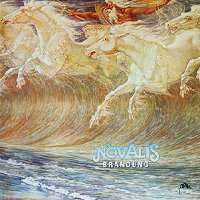 "Brandung" was clearly an album designed not only to maintain the success the band had gained with "Sommerabend", but also expand it further. And it worked. Glossy, polished and with a clear focus on lighter, more upbeat and catchier melodies, but fortunately still framed within the symphonic progressive rock style. Based around a beautiful Mellotron theme and an immediately catchy chorus, Job's opener "Irgendwo, Irgendwann" even became a sizeable hit in Germany. Mühlbück also revealed himself as a talented songwriter. The short acoustic ballad "Wenn Nicht Mehr Zahlen und Figuren" features his voice at its pleasantly best. "Astralis" was however more typical for his compositional style, and would become the best-known and most popular track from the album. It opens and ends with an infectious synth/vocal theme, and the verse and chorus maintain the melodic and atmospheric qualities that always were Novalis' strongest card. Both tracks also continued the band's tradition of using Freiherr von Hardenberg's poetry in the lyrics. Rahn wrote the multipart suite "Sonnenwende" together with Mühlbück, and it would turn out to be the band's last side-long epic. It consists of four distinctive sections, and opens with the instrumental "Brandung" that features Rahn's Mellotron flute over a steady mid-paced rhythm. Shimmering piano, string-synths and clavinet also join in after a while, but are all quickly cut off when "Feuer bricht in die Zeit" comes in with its quirky, funky rhythm and utterly catchy chorus. "Sonnenfinsternis" builds up from a low-key vocal opening to a symphonic instrumental dominated by Rahn's organ, harpsichord and Mellotron-choir. The closing section "Dämmerung" has a mellow verse and quite mighty chorus before it ends in an emotional and grandiose finale well worthy the whole suite. "Brandung" was even acclaimed by the music-press, and that was not a thing that any symphonic progressive rock band could take for granted in 1977. "Brandung" was clearly an album designed not only to maintain the success the band had gained with "Sommerabend", but also expand it further. And it worked. Glossy, polished and with a clear focus on lighter, more upbeat and catchier melodies, but fortunately still framed within the symphonic progressive rock style. Based around a beautiful Mellotron theme and an immediately catchy chorus, Job's opener "Irgendwo, Irgendwann" even became a sizeable hit in Germany. Mühlbück also revealed himself as a talented songwriter. The short acoustic ballad "Wenn Nicht Mehr Zahlen und Figuren" features his voice at its pleasantly best. "Astralis" was however more typical for his compositional style, and would become the best-known and most popular track from the album. It opens and ends with an infectious synth/vocal theme, and the verse and chorus maintain the melodic and atmospheric qualities that always were Novalis' strongest card. Both tracks also continued the band's tradition of using Freiherr von Hardenberg's poetry in the lyrics. Rahn wrote the multipart suite "Sonnenwende" together with Mühlbück, and it would turn out to be the band's last side-long epic. It consists of four distinctive sections, and opens with the instrumental "Brandung" that features Rahn's Mellotron flute over a steady mid-paced rhythm. Shimmering piano, string-synths and clavinet also join in after a while, but are all quickly cut off when "Feuer bricht in die Zeit" comes in with its quirky, funky rhythm and utterly catchy chorus. "Sonnenfinsternis" builds up from a low-key vocal opening to a symphonic instrumental dominated by Rahn's organ, harpsichord and Mellotron-choir. The closing section "Dämmerung" has a mellow verse and quite mighty chorus before it ends in an emotional and grandiose finale well worthy the whole suite. "Brandung" was even acclaimed by the music-press, and that was not a thing that any symphonic progressive rock band could take for granted in 1977.
Novalis - "Vielleicht Bist Du Ein Clown?" (Brain 1978)
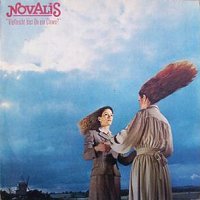 "Vielleicht Bist Du Ein Clown?" was another winner where Novalis consolidated their position as one of Germany's finest symphonic progressive rock bands. Job delivered one of Novalis' very best and most known tracks with the opener "Der Geigenspieler". This is one of those tracks that every symphonic progressive rock fan will love. Beautiful, melodic themes and an arrangement stuffed with mellotron. Mühlböck wrote the superb instrumental theme "Zingaresca" that was used in the German TV-series "Tatort". The track had a very good and catchy theme, and reminds me slightly of early Camel. "Manchmal fällt der Regen eben lang" is another Mühlböck-composition where the Novalis-sound took a poppier turn without loosing its progressive edge. The title-track was collaboration between Mühlböck and Rahn. It musically continued the style of the second part from "Sonnenwende" and included a great flute-solo from Mühlböck. "City-Nord" is a good and very German-sounding instrumental theme that will make you think of a train running through an icy and futuristic fairy-tale landscape. The last track "Die Welt wird alt und wieder jung" is a piano/mellotron dominated ballad with some nice harmonies. A peaceful, atmospheric and pleasant ending to a strong album. "Vielleicht Bist Du Ein Clown?" was another winner where Novalis consolidated their position as one of Germany's finest symphonic progressive rock bands. Job delivered one of Novalis' very best and most known tracks with the opener "Der Geigenspieler". This is one of those tracks that every symphonic progressive rock fan will love. Beautiful, melodic themes and an arrangement stuffed with mellotron. Mühlböck wrote the superb instrumental theme "Zingaresca" that was used in the German TV-series "Tatort". The track had a very good and catchy theme, and reminds me slightly of early Camel. "Manchmal fällt der Regen eben lang" is another Mühlböck-composition where the Novalis-sound took a poppier turn without loosing its progressive edge. The title-track was collaboration between Mühlböck and Rahn. It musically continued the style of the second part from "Sonnenwende" and included a great flute-solo from Mühlböck. "City-Nord" is a good and very German-sounding instrumental theme that will make you think of a train running through an icy and futuristic fairy-tale landscape. The last track "Die Welt wird alt und wieder jung" is a piano/mellotron dominated ballad with some nice harmonies. A peaceful, atmospheric and pleasant ending to a strong album.
Novalis - "Flossenengel" (Ahorn 1979)
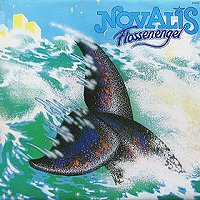 For their final 70's album, Novalis had switched label from Brain to Achim Reichel's own Ahorn label. And in a time where most other progressive rock bands either had sold out to average pop/rock or simply didn't exist anymore, Novalis had without any compromises at all made another excellent symphonic progressive rock album. "Flossenengel" was a concept-album about whales, and that was a very popular theme if you wanted to show the world that you were political correct in the late 70's. The instrumental that opens the album, "Atlanto", has easily one of the most beautiful themes that the band ever wrote and it has this very distinctive German touch to it. "Im Brunnen der Erde" starts with some wonderful mellotron-flute and evolves into a pleasant melodic track in the typical Novalis-tradition. "Brennende Freiheit" is a lot more dramatic. I guess somebody is killing a whale or something like that here? "Im Netz" is a dreamy and spacey track with keyboards that revokes "Sommerabend". The title-track is very nice little tune that even features some accordion to give it some kind of a sea-shanty mood. Side 2 opens with a nice instrumental-number that is followed by the musical surprising "Sklavenzoo" as it actually sounds slightly like Deep Purple! Ok, so "Alle Vollen Leben" could probably pass as a pop-tune, but a rather sophisticated one. The theme from "Atlanto" is repeated in the beautiful "Rückker" and stays as one of the highlights on the album. It builds up to a great finale that leads us into the closing track "Ob Tier, ob Mensch, ob Baum" that is based in a irresistible and powerful progressive rock riff. It's really good to hear a progressive rock band that had enjoyed success earlier in the 70's and still sounded like this in 1979. For their final 70's album, Novalis had switched label from Brain to Achim Reichel's own Ahorn label. And in a time where most other progressive rock bands either had sold out to average pop/rock or simply didn't exist anymore, Novalis had without any compromises at all made another excellent symphonic progressive rock album. "Flossenengel" was a concept-album about whales, and that was a very popular theme if you wanted to show the world that you were political correct in the late 70's. The instrumental that opens the album, "Atlanto", has easily one of the most beautiful themes that the band ever wrote and it has this very distinctive German touch to it. "Im Brunnen der Erde" starts with some wonderful mellotron-flute and evolves into a pleasant melodic track in the typical Novalis-tradition. "Brennende Freiheit" is a lot more dramatic. I guess somebody is killing a whale or something like that here? "Im Netz" is a dreamy and spacey track with keyboards that revokes "Sommerabend". The title-track is very nice little tune that even features some accordion to give it some kind of a sea-shanty mood. Side 2 opens with a nice instrumental-number that is followed by the musical surprising "Sklavenzoo" as it actually sounds slightly like Deep Purple! Ok, so "Alle Vollen Leben" could probably pass as a pop-tune, but a rather sophisticated one. The theme from "Atlanto" is repeated in the beautiful "Rückker" and stays as one of the highlights on the album. It builds up to a great finale that leads us into the closing track "Ob Tier, ob Mensch, ob Baum" that is based in a irresistible and powerful progressive rock riff. It's really good to hear a progressive rock band that had enjoyed success earlier in the 70's and still sounded like this in 1979.
Label
Novalis - "Wer Schmetterlinge Lachen Hört" (Brain 1980)
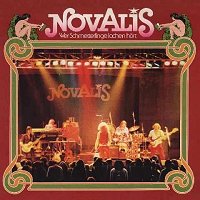 Just like most other labels do when they loose one of their major artists, Brain started to release a series of compilations with Novalis after they left their label. "Wer Schmetterlinge Lachen Hört" seems to be the most common one, and that's with good reason. It's a very good collection that gives a representative view of Novalis' music. As a bonus you're getting a live-version of "Astralis" that isn't to be found on any other album. The title-track is also in a live-version with Muchböck on vocals, but it had previously been available on the live-album "Konzerte" from 1977. Both tracks proves beyond any doubt that Novalis was a very tight and strong live-band who could perform their material in a fresh and energetic way on stage. The rest of the album is made up of tracks from "Sommerabend", "Brandung" and "Vielleicht Bist du Ein Clown?". The selections couldn't have been much better considering the limits of what you can get on a single album. This album reminds me a lot of why I'm regarding Novalis to be one of the very best symphonic progressive rock bands ever from Germany. So if you find it and haven't heard this great band yet, pick it up. Just like most other labels do when they loose one of their major artists, Brain started to release a series of compilations with Novalis after they left their label. "Wer Schmetterlinge Lachen Hört" seems to be the most common one, and that's with good reason. It's a very good collection that gives a representative view of Novalis' music. As a bonus you're getting a live-version of "Astralis" that isn't to be found on any other album. The title-track is also in a live-version with Muchböck on vocals, but it had previously been available on the live-album "Konzerte" from 1977. Both tracks proves beyond any doubt that Novalis was a very tight and strong live-band who could perform their material in a fresh and energetic way on stage. The rest of the album is made up of tracks from "Sommerabend", "Brandung" and "Vielleicht Bist du Ein Clown?". The selections couldn't have been much better considering the limits of what you can get on a single album. This album reminds me a lot of why I'm regarding Novalis to be one of the very best symphonic progressive rock bands ever from Germany. So if you find it and haven't heard this great band yet, pick it up.
Novalis - "Augenblicke" (Ahorn 1980)
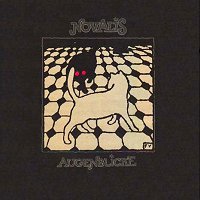 Novalis entered the 80's with an even and fine album, although not as strong as "Flossenengel". Still, there's not a bad track here and the band maintained their sense for strong melodies and atmospheric arrangements. Lutz Rhan had unfortunately dropped the mellotron and instead included some 80's sounding synths, but he still used organ and old 70's synths and still showed good taste in the sounds he used and the way he used them. Mühlböck had yet again found his flute and used it on the cheerful instrumental "Cassandra" and "Als Kleiner Junge". The last mentioned track showed together with "Herbstwind" and "Begegnungen" that the band still had their sense for pleasant and melodic tracks with romantic and dreamy lyrics that shivers with beauty and poetic imagery. There's also a bunch of instrumental-numbers here. "Danmark" is a very typical Rhan-theme with a nice melody and tasty keyboards. "Sphinx" is a bit heavier while "Mit Den Zugvogeln" is a very symphonic and atmospheric piece. A perfect track to listen to while taking a walk in the forest on a sunny day. "Ich Hab Noch Nicht Gelernt Zu Leben" and "Magie Einer Nacht" demonstrated on the other hand their ability to write catchy and commercial tunes. "Augenblicke" was a fine way for founder member Heino Schünzel (who left the band after this album) to end his time with Novalis. Novalis entered the 80's with an even and fine album, although not as strong as "Flossenengel". Still, there's not a bad track here and the band maintained their sense for strong melodies and atmospheric arrangements. Lutz Rhan had unfortunately dropped the mellotron and instead included some 80's sounding synths, but he still used organ and old 70's synths and still showed good taste in the sounds he used and the way he used them. Mühlböck had yet again found his flute and used it on the cheerful instrumental "Cassandra" and "Als Kleiner Junge". The last mentioned track showed together with "Herbstwind" and "Begegnungen" that the band still had their sense for pleasant and melodic tracks with romantic and dreamy lyrics that shivers with beauty and poetic imagery. There's also a bunch of instrumental-numbers here. "Danmark" is a very typical Rhan-theme with a nice melody and tasty keyboards. "Sphinx" is a bit heavier while "Mit Den Zugvogeln" is a very symphonic and atmospheric piece. A perfect track to listen to while taking a walk in the forest on a sunny day. "Ich Hab Noch Nicht Gelernt Zu Leben" and "Magie Einer Nacht" demonstrated on the other hand their ability to write catchy and commercial tunes. "Augenblicke" was a fine way for founder member Heino Schünzel (who left the band after this album) to end his time with Novalis.
Novalis - "Neumond" (Vertigo 1982)
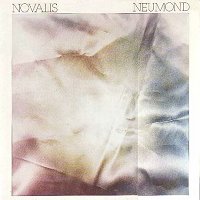 Instead of replacing Heino Schünzel, Novalis chose to hire Heinz Fröhling (ex-Schicke, Führs, Fröhling) to play bass on "Neumond". The album showed a band that moved further and further into a more commercial and pop-oriented territory, especially on such blatantly commercial numbers as "Du bist Schön" and the single "Oft Sagt Man Mehr, Wenn Man Schweigt", the latter one complete with saxophone of the sappy and sugary kind (meaning it's not like how the instrument was used by progressive rock bands in the 70's). The band also tried to update their sound a bit. This is most apparent in the opener "Anakonda" and the title-track that both sound much more modern than anything they had done before. Still, the most different track is "Frühsport im Sachsenwald". It starts with a one-chord power-riff over Rahn's spacey synths before it goes into a mid-tempo rocker with rhythmically spoken vocals, not sounding like Novalis at all. The band should probably be credited for trying some new and unexpected things, but it's really not much of a song. But there are still traces of their progressive past to be found here. "Nachttraum" is a pleasant progressive ballad with flute, while "Blauer Morgen" is a hauntingly beautiful instrumental theme. "Kein Frieden" is perhaps not very progressive, but it's still a quite cool and catchy song with a marching break in the middle. So overall, "Neumond" had its moments, but not many enough to make the album worthwhile for others than fans of Novalis. Instead of replacing Heino Schünzel, Novalis chose to hire Heinz Fröhling (ex-Schicke, Führs, Fröhling) to play bass on "Neumond". The album showed a band that moved further and further into a more commercial and pop-oriented territory, especially on such blatantly commercial numbers as "Du bist Schön" and the single "Oft Sagt Man Mehr, Wenn Man Schweigt", the latter one complete with saxophone of the sappy and sugary kind (meaning it's not like how the instrument was used by progressive rock bands in the 70's). The band also tried to update their sound a bit. This is most apparent in the opener "Anakonda" and the title-track that both sound much more modern than anything they had done before. Still, the most different track is "Frühsport im Sachsenwald". It starts with a one-chord power-riff over Rahn's spacey synths before it goes into a mid-tempo rocker with rhythmically spoken vocals, not sounding like Novalis at all. The band should probably be credited for trying some new and unexpected things, but it's really not much of a song. But there are still traces of their progressive past to be found here. "Nachttraum" is a pleasant progressive ballad with flute, while "Blauer Morgen" is a hauntingly beautiful instrumental theme. "Kein Frieden" is perhaps not very progressive, but it's still a quite cool and catchy song with a marching break in the middle. So overall, "Neumond" had its moments, but not many enough to make the album worthwhile for others than fans of Novalis.
Novalis - "Sterntaucher" (Vertigo 1983)
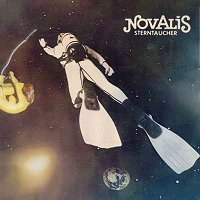 Even "Neumond" had some progressive tendencies left, but our German friends unfortunately removed their last remaining progressive roots in favour of rather generic-sounding 80's rock on "Sterntaucher". The band had again hired Heinz Fröhling to handle the bass, although he couldn't do anything about Novalis' descent into the mainstream. The two opening tracks "Fährmann" and "Ich Will Hier 'Raus" are both competent and somewhat catchy AOR songs, but the romantic atmosphere and symphonic progressive rock of classic Novalis is long gone. The last mentioned track also suffers from some awful electronic drums in the middle, another typical crappy thing that all bands in 1983 should use to be cool and fashionable. The supposed epic songs, such as "Keiner kann Gewinnen" and "Grenzen", has more in common with 80's powerballads than progressive rock. And the title-track mixes typical 80's pop with reggae, just to make it even worse and more half-assed. "Kleinwenig Mehr" has no other purpose than trying to be a hit-song - forced, strained and also failed, as it never became a hit. The instrumental "Sinus" that closes the album is acceptable, but has absolutely no chance against the band's many great instrumentals from the 70's ("Impressionen", "Aufbruch", "Zingaresca", "City-Nord" and the perhaps greatest theme, "Atlanto"). "Sterntaucher" will probably please fans of 80's rock, but progressive rock fans can safely stick with Novalis' excellent 70's albums instead. Even "Neumond" had some progressive tendencies left, but our German friends unfortunately removed their last remaining progressive roots in favour of rather generic-sounding 80's rock on "Sterntaucher". The band had again hired Heinz Fröhling to handle the bass, although he couldn't do anything about Novalis' descent into the mainstream. The two opening tracks "Fährmann" and "Ich Will Hier 'Raus" are both competent and somewhat catchy AOR songs, but the romantic atmosphere and symphonic progressive rock of classic Novalis is long gone. The last mentioned track also suffers from some awful electronic drums in the middle, another typical crappy thing that all bands in 1983 should use to be cool and fashionable. The supposed epic songs, such as "Keiner kann Gewinnen" and "Grenzen", has more in common with 80's powerballads than progressive rock. And the title-track mixes typical 80's pop with reggae, just to make it even worse and more half-assed. "Kleinwenig Mehr" has no other purpose than trying to be a hit-song - forced, strained and also failed, as it never became a hit. The instrumental "Sinus" that closes the album is acceptable, but has absolutely no chance against the band's many great instrumentals from the 70's ("Impressionen", "Aufbruch", "Zingaresca", "City-Nord" and the perhaps greatest theme, "Atlanto"). "Sterntaucher" will probably please fans of 80's rock, but progressive rock fans can safely stick with Novalis' excellent 70's albums instead.
Ñu - "A Golpe De Latigo" (Chapa 1978)
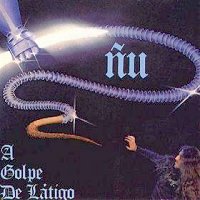 Excellent heavy-progressive from Spain. This was the band's second album, and it sounds like a mix of Deep Purple and their countrymen Crack. The band used strings on some passages, and a track like "La Llegada De Los Dioses" manages to sound very symphonic AND rocking and energetic at the same time. The album opens great with a Tull-like (there's plenty of superb flute on the whole album) intro that flows over in the VERY energetic title-track. This ROCKS! But there are also some more relaxed moments here, like "El Flautista". The flute sounds simply beautiful! I can't point out what makes me say it, but I think the whole album has a very Spanish progressive sound to it that I love. If you like heavy progressive, and 70's hard-rock in general, then you need this album. Excellent heavy-progressive from Spain. This was the band's second album, and it sounds like a mix of Deep Purple and their countrymen Crack. The band used strings on some passages, and a track like "La Llegada De Los Dioses" manages to sound very symphonic AND rocking and energetic at the same time. The album opens great with a Tull-like (there's plenty of superb flute on the whole album) intro that flows over in the VERY energetic title-track. This ROCKS! But there are also some more relaxed moments here, like "El Flautista". The flute sounds simply beautiful! I can't point out what makes me say it, but I think the whole album has a very Spanish progressive sound to it that I love. If you like heavy progressive, and 70's hard-rock in general, then you need this album.
Nuova Idea - "Clowns" (Ariston 1973)
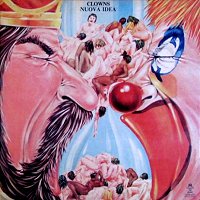 An excellent album! All the Deep Purple influences were gone, and the band now took influences from bands as Gentle Giant, Yes and Genesis to create a very enjoyable album of progressive rock. Yes, and this time there's no doubt, this IS progressive rock! The riff on the opening track will remind you a little of Gentle Giant's "Prologue", and this track is symphonic progressive of a kind most progressive rock fans will enjoy, just as the rest of the album. The songwriting and arrangements are great. One of the vocalists has a rather weird voice, especially in the more quiet parts, but I like him anyway. The title track has some very symphonic and grandiose parts which gets relived by the more aggressive vocal-parts. "Il Gardino Dei Sogni" and "Una Vita Nuova" are both tracks of melodic progressive at its best. Very strong melodies and themes. An album you should get. An excellent album! All the Deep Purple influences were gone, and the band now took influences from bands as Gentle Giant, Yes and Genesis to create a very enjoyable album of progressive rock. Yes, and this time there's no doubt, this IS progressive rock! The riff on the opening track will remind you a little of Gentle Giant's "Prologue", and this track is symphonic progressive of a kind most progressive rock fans will enjoy, just as the rest of the album. The songwriting and arrangements are great. One of the vocalists has a rather weird voice, especially in the more quiet parts, but I like him anyway. The title track has some very symphonic and grandiose parts which gets relived by the more aggressive vocal-parts. "Il Gardino Dei Sogni" and "Una Vita Nuova" are both tracks of melodic progressive at its best. Very strong melodies and themes. An album you should get.
 |